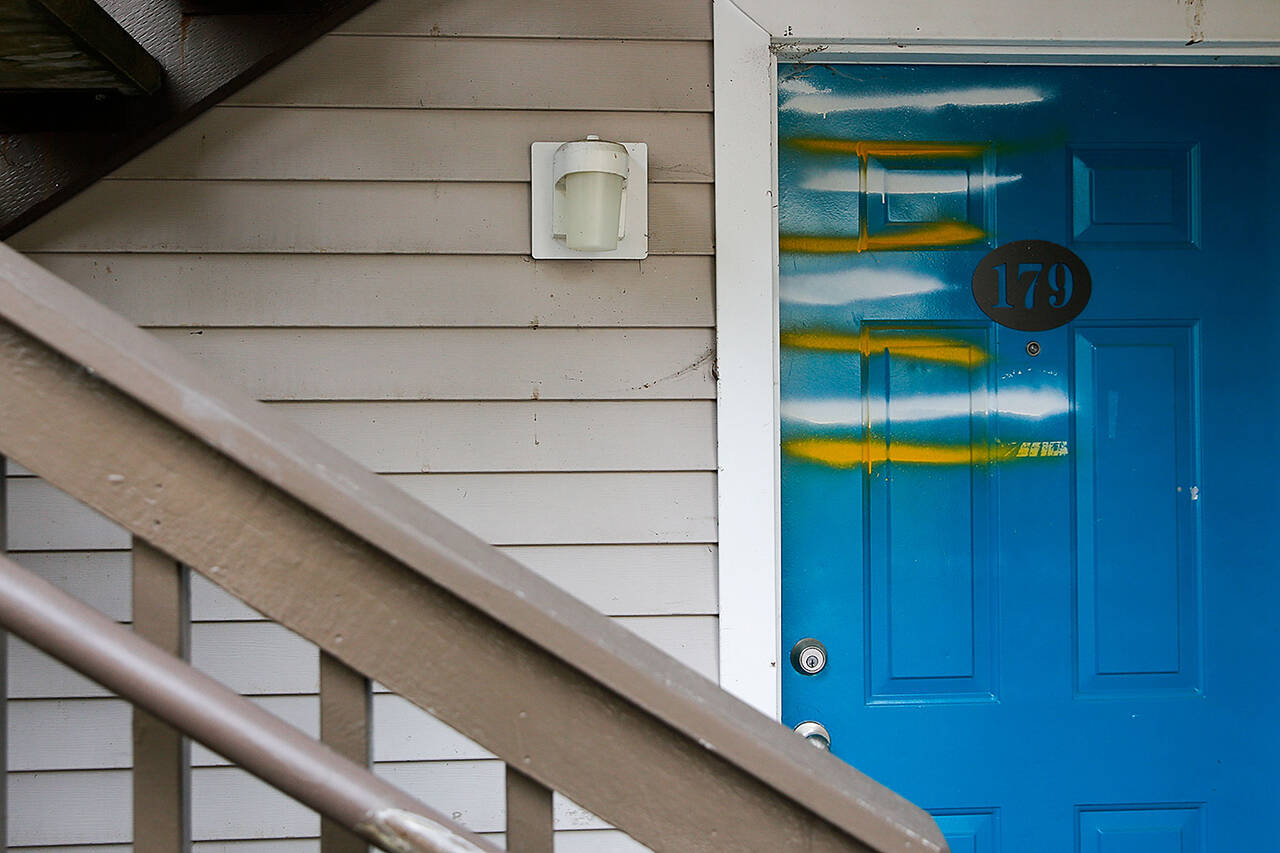LYNNWOOD — A property management company that ran Whispering Pines, a low-income apartment complex, gave tenants up to $2,000 in exchange for a promise not to take legal action against the company or the Housing Authority of Snohomish County, according to records obtained by The Daily Herald.
Cash-strapped tenants were also banned from making any “disparaging remarks” about their former landlords, and agreed to delete any negative online comments about Allied Residential and HASCO within four days. And to get the cash, they could not tell anybody the deal existed.
Private landlords often use non-disclosure agreements.
What’s extraordinary in this case is that more than 50 low-income tenants also agreed not to speak out against a public agency, HASCO, which was supposed to provide up to $100,000 in moving expenses via federal stimulus money.
Victoria Garcia, managing attorney for the Housing Justice Project at Snohomish County Legal Services, said the agreement is a standard deal known as “cash for keys.” But Garcia said she had never seen a public agency make it a condition for tenants to get help.
“A lot of people see the money and think, ‘This is great!’” Garcia said. “They sign off on it and move on from the place, because that’s what they feel is in their best interest.”
The county’s Whispering Pines apartment complex had 240 apartments in Lynnwood near the intersection of Highway 99 and 52nd Avenue W. Nearly all of the tenants received some type of government help while living on the property. In 2018, the housing agency notified tenants it planned to demolish the complex in late 2021, due to health and safety hazards.
Tenants told The Herald in July and August that they received little to no help from HASCO as they tried to find new housing, and that they struggled to save for moving expenses and application fees.
The Housing Authority of Snohomish County paid tenants either $1,000 or $2,000 in late summer — a total of $94,000 — on the understanding that the county’s Human Services Department would reimburse the housing agency. It’s unclear if county officials were aware of the exchange for silence.
“If Management learns that Resident has disclosed the terms of this settlement to any third party, it shall immediately and irreversibly revoke the compensation granted under this agreement and may immediately charge Resident for repayment of those amounts owing, and shall be entitled to enforce that action through litigation,” reads the agreement signed by residents.
Marko Liias, a county spokesman, said the Human Services Department has been finalizing the contract. That could take another week or two, he said.
“HASCO is managing the relocation process,” Liias said. “They’re managing that relationship and (the county) is here to provide the financial support. … These are HASCO residents and that relationship is really between HASCO and the residents.”
Human Services Director MJ Brell Vujovic did not respond to inquiries from The Herald.
HASCO Executive Director Duane Leonard said in an email he was aware Allied Residential gave tenants the contracts, and that they were for “documentation purposes.” Asked if the agency would enforce the silence clause, Leonard declined to comment further.
Leonard did not return a phone call from The Herald. HASCO board president Joseph Alonzo did not respond to requests for comment, but was included in Leonard’s email. Allied Residential portfolio manager Valerie Hill, who signed the agreements, declined to comment.
Edmund Witter, managing attorney for the King County Bar Association’s Housing Justice Project, agreed the contract looked like a typical cash for keys offer. Witter also said the agreements are probably enforceable.
Leonard has maintained it wasn’t the agency’s job to provide moving assistance, and that tenants had plenty of notice. In August, however, the county set aside $100,000 for moving expenses for HASCO. Volunteers and local nonprofits said housing authority staff then told them outside help was no longer needed.
Less than two weeks before the complex closed, however, roughly 50 apartments were still occupied. Leonard didn’t know how much the agency was providing each tenant for moving expenses or what the money could cover. Later that day, HASCO spokesperson Pam Townsend emailed The Herald that the agency was providing $2,000 lump-sum payments to the tenants.
The Herald obtained the contracts as the first installment of a records request submitted in September.
Katie Hayes: katie.hayes@heraldnet.com; Twitter: @misskatiehayes.
Katie Hayes is a Report for America corps member and writes about issues that affect the working class for The Daily Herald.
Talk to us
> Give us your news tips.
> Send us a letter to the editor.
> More Herald contact information.

























